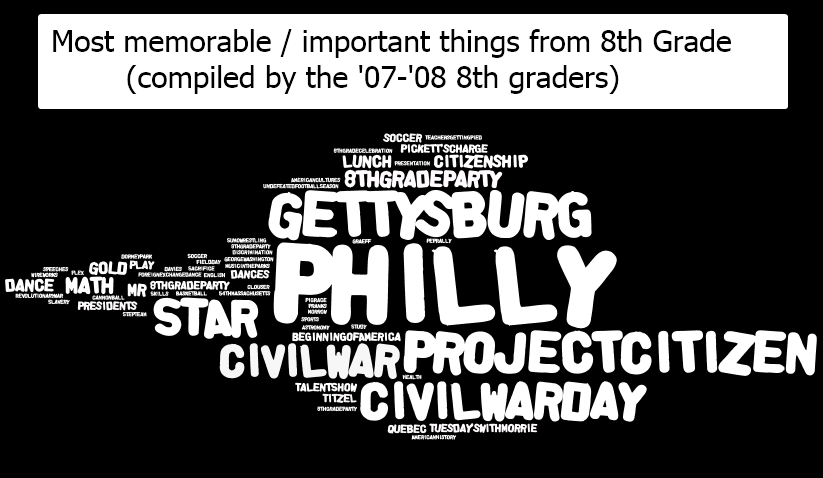
I am pleased, and not surprised, to see the two field trips (Philadelphia and Gettysburg) are two of the most common responses. I would love to teach history without ever stepping into a classroom. The best way to teach history is to go [cliche alert] where history took place and walk in the footsteps of those who went before us. Instead of just watching videos, looking at maps, and discussing Pickett's Charge, why not actually walk the field where the 12,000 Confederate soldiers walked on July 3rd, 1863. Or instead of reading about our founding fathers (and mothers) why not sit in the actual pew where they worshiped (where many of our students did at Christ Church in Philadelphia). History can be experienced and true learning can be enhanced if we just know where to go. It is sad to think that schools have eliminated educational field trips due to budgetary constraints. We have a Civil War day, which is great, but it doesn't come close to the experience of actually being where history was made. On my family's way to the Poconos for vacation we made our obligatory history stop. I decided to take my family into a mine. What better way to teach my children to appreciate the things they have and the life they live. The 40 minutes we spent inside that mountain will be remembered by my girls for the rest of their lives. I believe that the field trips my students took to Philadelphia and Gettysburg will be remember for the rest of their lives, as well. Will they remember all the details? No. Will they have an increased interest to learn more about our history? I believe so!
Another large response was Project Citizen. Students had to learn about public policy so they could determine a problem in the community that was a public policy issue. The students worked collaboratively researching a local problem. A large part of the research was to interview experts and to seek out information from reliable sources. The students then broke into 4 groups to prepare a presentation on the Problem, Alternate Solutions, the Proposed Policy, and an Action Plan. Each group had subcommittees working on a wiki, display board, information binder, and a speaker. The key to the whole experience was the presentation to real local policymakers. The students pitched their policy proposal to a School Board member and two Township Supervisors. The real life nature of the project is what made it so memorable.
How else can we make our learning experiences for students real life?



1 comment:
Thanks for including me in your blogroll!
Larry
Post a Comment